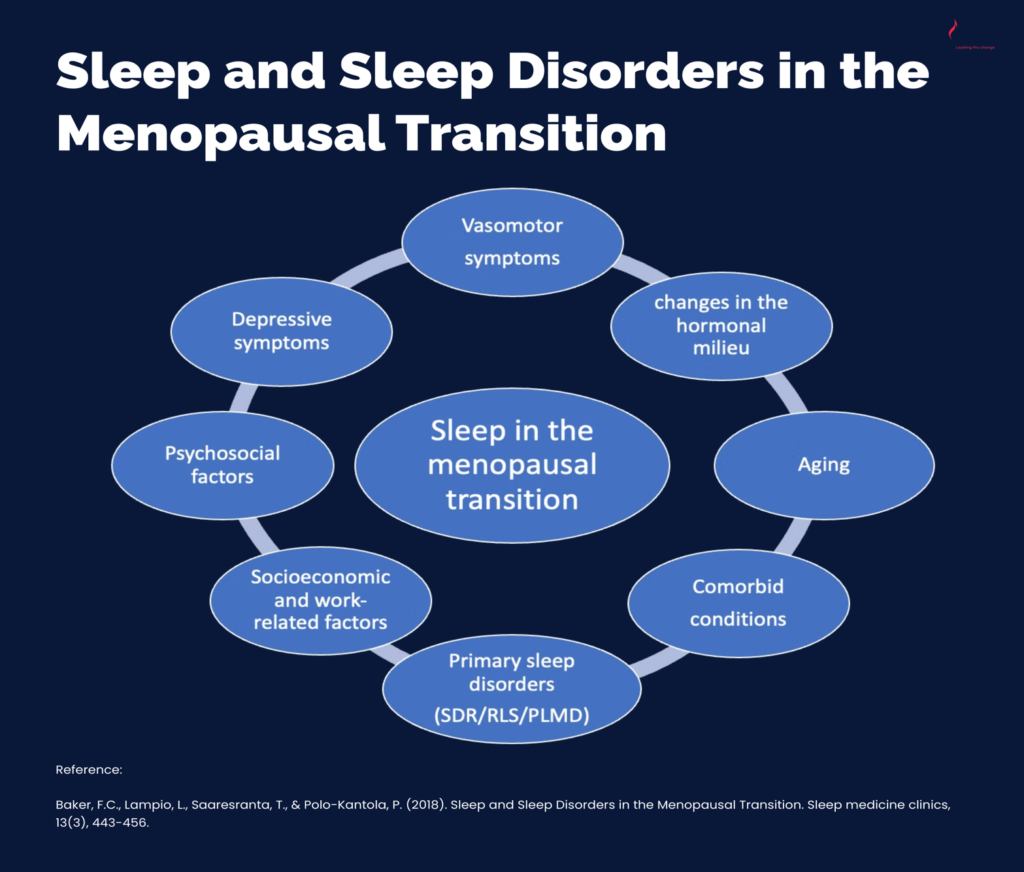Section 2: Understanding Sleep Disturbances
Symptoms of sleep disturbances related to menopause include:
• Insomnia/the inability to fall asleep.
• Waking up frequently throughout the night or waking up early
• Being unable to go back to sleep.

Symptoms of sleep disturbances related to menopause include:
• Insomnia is the inability to fall asleep, stay asleep, or waking up too early.
• Waking up frequently throughout the night or waking up early.
• Being unable to go back to sleep.
You may also toss and turn throughout the night and wake up feeling fatiguedor as if you’ve barely gotten any sleep at all.
There are multiple causes of sleep disruptionduring menopause:
- Vasomotor Symptoms (VMS, i.e., Hot Flashes and Night Sweats)
- Genitourinary Syndrome of Menopause (GSM)
- Changes in hormones
- Aging
- Coexisting medical conditions
- Primary sleep disorders
- Socioeconomic and work factors
- Psychosocial factors
- Depressive symptoms

Here’s a brief description of each type of symptom that can cause sleep disruption during menopause:
Vasomotor Symptoms (Hot Flashes and Night Sweats) – These are sudden feelings of warmth, often accompanied by sweating, flushing, and chills. Night sweats specifically occur at night and can significantly disrupt sleep by causing frequent awakenings.
Changes in Hormones – Hormonal fluctuations, particularly decreases in estrogen and progesterone, can affect sleep architecture and lead to insomnia. These changes can also make the body more sensitive to temperature variations, impacting sleep.
Aging – As people age, there are changes in sleep patterns, including decreased sleep efficiency, shorter sleep duration, and alterations in the stages of sleep. These changes can contribute to sleep disturbances during menopause.
Coexisting Medical Conditions – Conditions such as arthritis, diabetes, heart disease, and respiratory problems can cause or exacerbate sleep disturbances. Menopausal women often experience a convergence of age-related health issues that can affect sleep.
Primary Sleep Disorders – Disorders such as obstructive sleep apnea (characterized by pauses in breathing during sleep) and restless leg syndrome (a neurological disorder that causes an irresistible urge to move the legs) can disrupt sleep and are often exacerbated during menopause.
Socioeconomic and Work Factors – Stress related to job, economic hardship, or instability can contribute to insomnia and poor sleep quality. Shift work and job stress can particularly disrupt the circadian rhythm, leading to sleep problems.
Psychosocial Factors – Factors such as stress, anxiety, and significant life changes (like children leaving home or caregiving for elderly parents) can lead to increased sleep disturbances. These stressors can exacerbate menopausal symptoms, including sleep disruption.Depressive Symptoms – Depression and mood disorders, which are more common during menopause, can negatively affect sleep quality. Symptoms of depression such as sadness, loss of interest in activities, and altered sleep patterns are common contributors to insomnia.